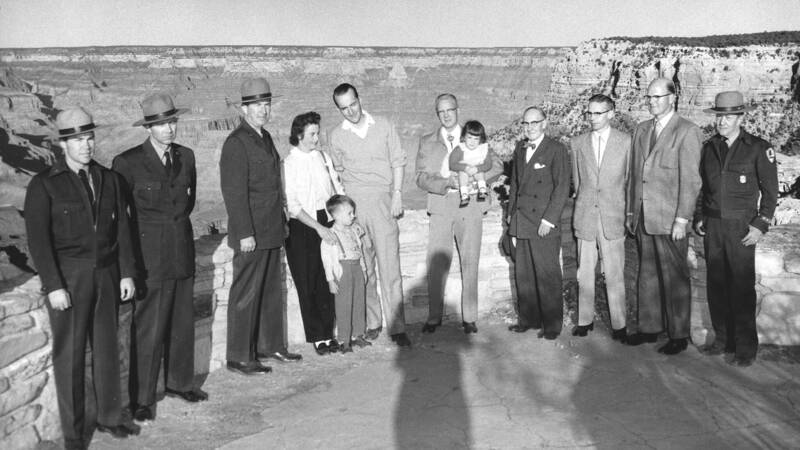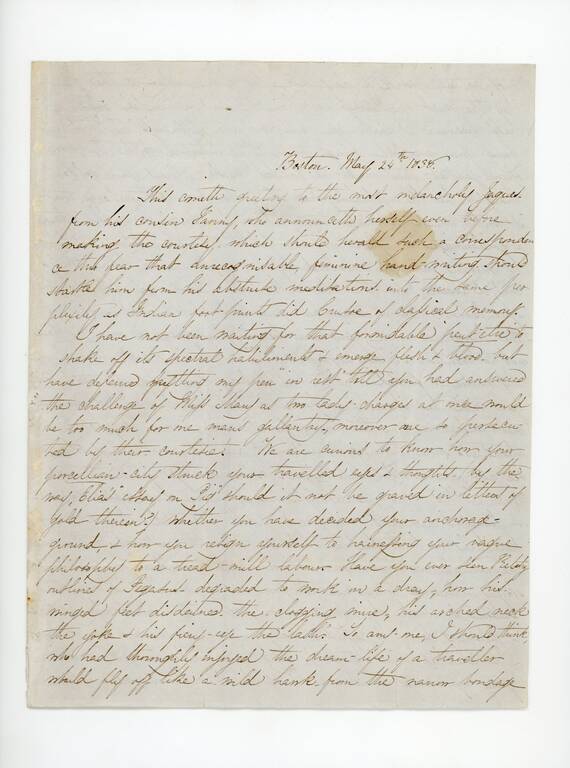Here are 4 major issues that need to be addressed to help our parks thrive. You, too, can get involved in getting Congress to solve them.
Every April, the National Parks Conservation Association and hundreds of our members, supporters, partners and volunteers, travel to Washington, D.C., to meet with members of Congress to advocate for the protection of our more than 420 national parks. While NPCA meets with members of Congress and the administration regularly about challenges that impact our national parks, our annual lobby day gives park advocates from across the country the opportunity to collectively speak up for the future of their national parks and communities.
Elected officials have a responsibility to know what their constituents care about and the reasons why they support or oppose important issues. Members of Congress must be able to justify their decisions — and in turn, voters have an opportunity to hold those elected leaders accountable at the ballot box. This represents democracy at its best, and why national park advocates come back to Capitol Hill every spring to show their support for parks and make their voices heard.
The importance of this year’s lobbying initiative April 9-11, which we call National Park Advocacy Week, is undeniable. National parks are reaching a critical breaking point from declining budgets and staff, skyrocketing visitation, cumulating maintenance needs and worsening climate disasters. The good news: There are solutions available for lawmakers to act on right now.
Here are four actions park advocates from across the country will be asking Congress to take:
1. Increase park funding and staffing.
National parks are experiencing record numbers of visitors every year, including more than 325 million visits last year alone, an increase of 13 million over 2022. The trend is clear — national parks are popular. While their popularity comes as no surprise to the millions of people who visit America’s national parks every year, the fact that the National Park Service’s budget is not keeping up with its needs is less obvious.
Between 2012 and 2022, park visitation grew by 10%, but staffing eroded by 13%. In fact, national parks employ 2,200 fewer staff now than they did in 2011. Years of federal funding shortfalls have forced park managers to make hard decisions about what jobs to fill and what services to provide, leaving overwhelmed park rangers juggling multiple duties, doing whatever is needed to protect our parks. The additional funding cuts included in the most recent spending bill enacted by Congress will only make matters worse, leading to fewer staff and resources to ensure quality visitor experiences and safety and to protect our natural and culturally significant sites.

William Purcell became the 1,000,000th visitor to Grand Canyon National Park in 1956. The Purcell family is pictured with park and concession personnel on the canyon rim.
NPS/Grand Canyon Museum CollectionPeople love Yellowstone, Acadia, Grand Canyon and other national parks — they are icons of our country.
Congress needs to respond to the public’s deep affection by making more investments to staff them and grow programs for visitors and families, which is why park advocates are asking members of Congress to increase operations funding for the National Park Service by at least $250 million. This would help bring back hundreds of staff to parks across the country and provide the resources needed to not only make ends meet, but help parks thrive.
2. Fix our parks.
Nearly four years ago, through the persistence and dedication of NPCA and park advocates across the country, we witnessed the historic, bipartisan passage of the Great American Outdoors Act (GAOA). This dedicated funding is addressing hundreds of overdue maintenance projects in national parks, such as crumbling roads, worn-out trails, failing water and sewer systems, and other maintenance issues. It also is greatly improving visitor experiences for the millions of people who travel to these treasured places every year.
Since its passage, GAOA has addressed billions of dollars in repair needs in nearly every state, including fixing damaged trails at Mammoth Cave National Park, replacing a failing water system at Organ Pipe Cactus National Monument, rehabilitating staff housing at Glacier Bay and Great Sand Dunes national parks, and enhancing campgrounds at Yosemite, Rocky Mountain and Mount Rainier national parks.
While each park’s repair needs differ in size and scope, they exist because of a common problem: insufficient congressional funding. They’ve been put on the backburner for decades, which is far too long.
Despite the progress GAOA has made, the challenge persists, as the backlog of repair needs at national parks has reached $23 billion. The cost of routine maintenance needs simply outpaces annual funding from Congress.
Through 2025, GAOA will continue to address critical repair projects and improve visitor experiences in parks, but the current funding won’t be able to repair every broken bathroom, deteriorating trail or outdated visitor center. Congress made huge strides with the passage of GAOA, but it’s clear that our parks need more help to protect the natural and cultural resources that tell our nation’s history and ensure parks can continue to welcome millions of visitors each year. We urge Congress to extend this important law by providing at least five more years of funding to fix our parks and keep this successful effort going.
3. Preserve our history.
Every one of America’s more than 420 national parks preserves an important piece of our collective history and culture. The millions of people who visit our national parks every year deserve exceptional and inspirational experiences, whether engaging with museum artifacts at Rosie the Riveter National Historical Park or joining a park ranger’s walking tour to learn about the Indigenous history of Mesa Verde National Park.

A letter from Frances Appleton Longfellow to Isaac Appleton Jewett, 1838.
NPS/Longfellow House-Washington’s Headquarters National Historic Site; Archives Number 1011/002.001-008#002The Park Service is charged with not only preserving our shared American history but bringing its stories to life and creating unforgettable memories for millions of visitors every year. Despite the magnitude of this mission, funding and staffing shortfalls prevent the Park Service from effectively managing, preserving and interpreting the artifacts and stories they hold. For instance, in the last 10 years the Park Service has lost 25% of its historians because tight budgets have forced park managers to make difficult choices that have led to these positions going unfilled.
On top of staffing woes, more intense hurricanes, floods and wildfires exacerbated by climate change are putting significant historic assets increasingly at risk of being lost forever.
As we near the 250th anniversary of our country’s independence, action is even more critical. In July 2026, our nation will commemorate this milestone, and as on the agency that employes and trains so many of American’s greatest storytellers, the Park Service will play a pivotal role in honoring our nation’s history. We must ensure parks have the resources and staff necessary to fulfill this responsibility.
That’s why we urge Congress to enact the Cultural Resource Challenge, which would provide $250 million over five years to bolster the Park Service’s historic and cultural resource management. These funds will allow the hiring of historians, archivists, curators and other professionals to preserve America’s most important places and tell their stories so all park visitors can cultivate a deeper appreciation and understanding of our nation’s past.
4. Tell all people’s stories.
As the United States continues to evolve, so too must our national parks and the stories they tell. Although these stories can be complex and complicated, it’s critical that we continue to collect, protect and share them in order to understand and learn from them. It’s vital that everyone sees themselves reflected and feels welcomed in their national parks — and we can achieve that by bringing to light racially and culturally diverse experiences and improving accessibility for all.
For over a century, NPCA and our partners have come together to preserve wild lands, waters, wildlife and cultural sites. In partnership with communities across the country we continue to advocate for lasting protections for new national parks and the expansion of existing park sites. These sites would help commemorate our country’s history and culture from civil rights to Civil War, as well as preserve beautiful landscapes and provide exceptional recreational opportunities that are accessible to all.
There are many bills making their way through Congress — from the largest estuary in the nation to some of the last wild lands and historic sites in the greater Los Angeles area. We urge Congress to support the passage of individual bills, or a public lands legislative package, that expand our National Park System. These include the Big Bend National Park Boundary Adjustment Act, Chesapeake National Recreation Area Act and Rim of the Valley Corridor Preservation Act.
Speak up for your national parks
NPCA has a long and successful track record of working with communities and congressional park champions to positively influence the policies affecting national parks. When national parks need our help, NPCA and our members and supporters show up and speak out on their behalf.
This National Park Advocacy Week is no different. But you don’t have to travel to Washington, D.C., to make an impact.
We all have an opportunity to hold lawmakers accountable to their commitments, so we encourage anyone who loves our national parks as much as we do to contact your representatives and advocate for the future of our national parks and communities.
Stay On Top of News
Our email newsletter shares the latest on parks.
About the author
-
 Angela Gonzales Associate Director, Communications
Angela Gonzales Associate Director, CommunicationsAngela joined NPCA in October 2017 and is an Associate Director of Communications. She currently manages outreach and communications for the Government Affairs team and Conservation Programs.
-
General
-
Issues


